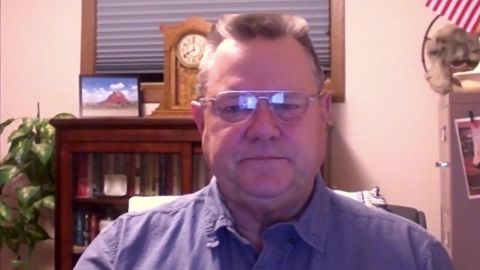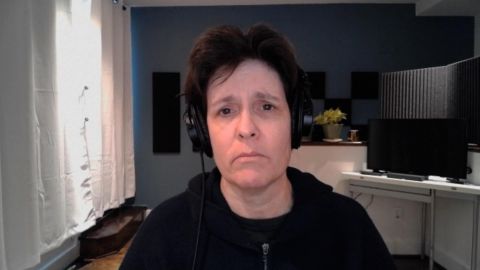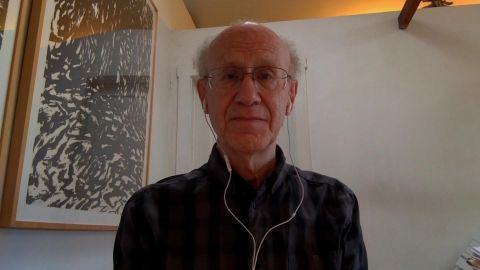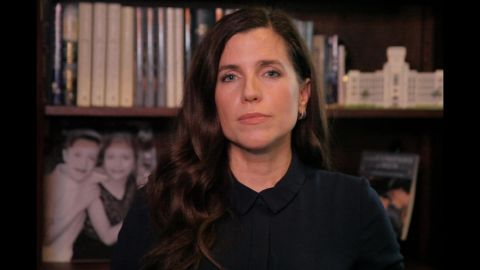Read Transcript EXPAND
CHRISTIANE AMANPOUR: Now, we cross the aisle with our next guest. Like Congresswoman Mace, Democratic Senator Jon Tester of Montana was in his office, just a stone’s throw away from the Capitol, when those rioters attacked. He says the siege was — quote — “a terrorist act.” Aside from being a third term lawmaker, Tester is the Senate’s only working farmer, a job that helps him understand the crucial issues of how Democrats can appeal to rural America, an issue that he addresses in his book “”Grounded: A Senator’s Lessons on Winning Back Rural America.” And here he is talking to our Walter Isaacson about all of this.
WALTER ISAACSON: Thank you, Christiane. And, Senator Jon Tester, welcome to the show.
SEN. JON TESTER (D-MT): It’s great to be here. Thank you.
ISAACSON: You have seen the video now of what happened when the mob struck the Capitol. And over and over, we’re seeing more gruesome scenes. How has your thinking about this mob action changed over the past few days?
TESTER: Well, I mean, much more serious than when I first saw it. And I thought it was very, very serious. But it was absolutely a coup attempt. There is no doubt about that. It was a group of people that wanted to take our duly elected elections and put them in the rearview mirror and put somebody in the presidency that wasn’t duly elected. So, it was a very serious offense. And the fact that we lost a number of police officers now and other folks that have gotten injured to this process shows how irresponsible it was and how it just doesn’t represent what this country stands for at all. And I take it as a personal affront to not only who this country is, but who I am. I mean, I love this country. I think this is the greatest country that’s ever been on Earth. And to have a bunch of folks that were incited by the president of the United States come up and try to destroy this country is just an affront to who I am.
ISAACSON: You just said the president of the United States incited violence and tried to overthrow a duly elected election. Do you think that’s an impeachable offense?
TESTER: I do. I do think it’s an impeachable offense. The question becomes on impeachment, is there really a path to get it done in a timely basis? I don’t even know. Certainly not going to happen before the inauguration. And I don’t know if impeachment still something you can do after president has left office.
ISAACSON: So, how should the president be held accountable?
TESTER: Well, look, I think the 25th Amendment is fine. I think there’s going to be some opportunities. By the way, this has to be done in a bipartisan way. And I think there’s enough folks on the other side of the aisle that are sick of what’s transpired on Wednesday that they’re willing to step up. But there are some things I think that Congress can do. But, first of all, Walter, I think we need to have a discussion, have a debate on the floor about what the proper punishment is for this. But I don’t think it can go unpunished. I think it would be a huge mistake.
ISAACSON: You’re a Democrat, but you have worked very well with people on the other side of the aisle. To what extent are you having discussions with your Republican colleagues to find a way forward in which people can be held accountable, including the president?
TESTER: Well, I haven’t had those conversations yet, quite frankly, Walter. I’m hoping to be able to do that in person, when we get back again. I’m sitting in my home in Big Sandy, Montana, now. But the bottom line is, is that I have read countless things that the folks I have served with have said. There’s a lot of folks, both Democrats, Republicans, independents, that are very, very unhappy with what transpired. And I think there has to be accountability to actions. And I think I’m hearing that that’s what a lot of folks want to see in the Senate. And, hopefully, we can come together in a bipartisan way and do something that is — penalty meets the crime and move forward.
ISAACSON: One of the penalties that’s possible in the Constitution, if impeachment goes forward, is that President Trump would be barred from having public office ever again. Do you think that makes sense?
TESTER: I do. I don’t think — I cannot think of another act that was encouraged by the president of the United States, the sitting president of the United States, like I saw last Wednesday.
ISAACSON: One possibility being discussed is that the House would pass articles of impeachment this week, and then hold off sending them to the Senate, first of all, so that Biden’s agenda could be pushed through, and, secondly, so that we can have more time to contemplate it. What’s your thought about that process?
TESTER: I think that would be smart. I think it would give the Senate an opportunity to confirm some of these Cabinet nominees. And then we could think about the impacts of what transpired last Wednesday. I think that’s a smart move.
ISAACSON: If Trump is impeached by the House, but then the Senate doesn’t act or convict, doesn’t that send a message that what he did was all right?
TESTER: Well, I think it could. That’s why I — but let me also say this. I think the House needs to do what the House thinks is the right thing to do. But — and then pass the papers over to the Senate, and if, in fact, that’s what they determine is the right thing to do. And then the Senate can act. But, hopefully, there’s some conversation between Senator McConnell and Speaker Pelosi and Senator Schumer and Minority Leader McCarthy, because, honestly, I think this is a huge deal that happened on Wednesday. And I think to overlook it would not be good. I had been critical of Leader McConnell in the past because of the number of bills that are out there that should be on the floor. When the session was over with on Wednesday night, or early Thursday morning, I went up to Leader McConnell and I said: “Thank you. Thank you for what you have done today, because it was the right thing to do on certification of the elections.” And I will tell you that I read body language a lot. And that man was under a lot of stress. You could read it in his eyes. You could see it in expressions. I don’t want to do something for political purposes. I will just be honest with you. I don’t think this impeachment should be done because it gives Democrats an advantage or Republicans a disadvantage or vice versa. It needs to be done because it’s the right thing to do, because it’s what this country stands for, because we can’t allow somebody who gives a speech that talks about running through the — going up and fighting and doing the things that happened on Wednesday to allow to stand. And, hopefully, those conversations are happening within the leadership of the House and Senate, so that we don’t get in a situation where it becomes a partisan, bickering battle that has happened so many times in the past.
ISAACSON: To what extent do you feel that Senators Josh Hawley and Ted Cruz are partly accountable for what happened?
TESTER: Those folks along, with the other 11 senators, absolutely enabled this president to do what he did. There is no doubt about that. They helped him accomplish his goal, which I believe the president’s goal was to overrun the legislative branch of government. And that’s exactly what happened.
ISAACSON: And so do you think that Senators Hawley and Cruz, in particular, as the leaders of that group, should be held accountable in some way?
TESTER: I believe all 13 senators need to be held accountable in some way.
ISAACSON: How?
TESTER: Well, I think that’s up to the Senate, once again, while we’re — I mean, I think we need to have a discussion about it. But I think it goes anywhere from censure to expelling.
ISAACSON: And how would you expel senators for doing that? Do you think that’s even conceivable?
TESTER: It would take a two-thirds vote of the Senate to do that.
ISAACSON: Your wonderful book “Grounded” begins and ends with you having what you call the intestinal fortitude to stand up to Donald Trump. And you end up winning because of it. Explain to me that and the lessons for other senators today.
TESTER: Well, I think people appreciate authenticity, and I think they appreciate direct talk, direct talk. And that’s what I have tried to do. That’s really who I am. I can’t morph myself into something that I’m not, although I will tell you, in the three elections that I have been involved in for the United States Senate, my opponents have tried to morph me into something that I’m not. But the truth is, is that I think the people of Montana know me as somebody who tells it like it is, a pretty straight shooter. And that’s what I do. And I think that’s what people in agriculture do, too, honestly. It’s one of the interesting conundrums, I guess you would call it, in that I don’t know how a millionaire from New York City has such appeal in rural America, other than the fact that I don’t think Democrats do a good job of getting their message out. I don’t think they do a good job of showing up in rural America. And Donald Trump did do that. And I give him credit for that. But the bottom line is, I think I did it because I was authentic, I told people the way it was. I didn’t Milquetoast it. And I think people respect that.
ISAACSON: You’re out right now in your farm in Montana. You told me you’re putting away some hay that you have already harvested for the winter. Tell me why it is that rural America has such trouble with your party, the Democratic Party?
TESTER: I don’t think we message very well at all, Walter. I mean, I always give the example, if you walked into bar in Pep’s Bar in Big Sandy, Montana, and said — get into a political discussion, say, I’m a Democrat. I say, well, what do you believe in? Well, I believe in public education. I think we should work and make public education as strong as it can be. It’s the foundation of our democracy. I believe in good infrastructure. I believe in taking care of our veterans. The list goes on. And I think, if you were able to do that, and do it that cleanly, of course, I think everybody in the bar would be nodding their heads, you know? They would be saying, absolutely, that’s a person we want to put into office. The problem is, we don’t do a good job of talking about what we stand for. And then we get labeled, in the meantime, as being a socialist or wanting to defend the police, which is hogwash, quite honestly. And I heard it again this weekend on some of the talk shows in the morning. The truth is, is that the Democratic Party stands for working folks, stands for good education, good public education. It stands for making sure that our kids and our grandkids have opportunity going forward into the future. And we got to — we have to do a better job as Democrats talking about, this is what we believe in, and this is what we have done to accomplish that.
ISAACSON: You talk about defund the police. You walk into that bar you mentioned in Montana, people say, yes, you stand for all that, but don’t you stand for defunding the police. What do you say to them?
TESTER: No, absolutely do not. The police, in my opinion, are incredibly important to our society, to keeping law and order. We are a country of laws. And I saw what the police did that in the Capitol on Wednesday. And those folks are heroes, in my mind. They put up one heck of a fight, were badly outmanned. And that’s the way it is everywhere, whether it’s the highway patrolman going down the road picking up somebody that they don’t know what they’re going to come across, to the local town policeman that walks into a domestic violence situation. They don’t know what they’re going to come across. To the person who picks up a kid in high school because he’s swerving on the road and says, knock it off, that isn’t appropriate behavior. Those folks are so very, very important. Those first responders are so very, very important to our society and moving forward, that — and, by the way, I don’t serve with anybody in the Senate that wants to defund the police, nobody. But yet you get tagged with that kind of stuff.
ISAACSON: As you looked at the tapes of what happened in the Capitol, do you feel that it would have been different had it been African-Americans or black activists coming into the Capitol, and that there is some need for some criminal justice reform, as we look at how police treat different types of protests?
TESTER: Look, just as what happened with those 13 senators, that there has to be accountability for their actions, I think everybody has to have accountability for their actions. And I think that applies also to United States senators, to police officers, to — to everybody. I mean, actions have consequences. And so, if folks are acting improperly, if we don’t have equal justice served under the law, then the folks have to be held accountable for that, and that is just the way it needs to be. You know, I said the pledge of allegiance for 12 years when I was going to school, and it is about equal justice under the law, that’s what this country stands for. And so, there has to be accountability. Whether it is here, changes in our system, I don’t think know what the right answer is here. But in the end, I think we need to support our police and I think we need to hold the folks who aren’t acting appropriately accountable. And I think there are (INAUDIBLE), right, and they have very difficult position, where they have to make decisions in a split second, life and death decisions by the way. And so, I think that it is really important that we take all of that into consideration when we are talking about accountability. But I will tell you that there is no doubt with the stuff that I have seen on TV over the last — over my lifetime, quite frankly, that there are some folks out there that don’t believe in equal justice under the law, and they need to be held accountable.
ISAACSON: You’re on the appropriations committee, which should be in the next stimulus and COVID package?
TESTER: Look, Walter, what I hope happens is we get the vaccine distribute and we don’t need another one. But I would tell you that that’s probably not going to be the case. I think we need to look at the businesses that have really been hammered by this pandemic, particularity hospitality industry. And I think we ought to focus any sort of effort on dollars for those businesses who were really been hammered by this pandemic. And then I think we have to take a look at the families who were out of work, who, quite frankly, haven’t been able to get back to work and help those folks out some. So, the bottom line for me is any package that we pass in the Senate, in Congress, has to be very, very targeted moving forward. And I don’t think — just to be flat honest with you, I don’t think that we have done a good enough job targeting where the money needs to go to help move the economy around. And if we get to the point in March where there’s another package, I hope that folks come together and say, look, this money needs to be targeted, we need to make sure we’re getting the biggest bang for the buck as it’s distributed out. And I think then and only then will we stee true dollars appropriated to Congress working for the American people moving this economy forward in the right direction.
ISAACSON: What do you think of the simple idea of just giving people $2,000 stimulus check?
TESTER: For people that make $75,000 a year I think that is not targeting playing (ph) I would do it. I think we need to focus on folks who are unemployed because of this or underemployed because of this pandemic and focus some money to them, and I think that’s really important. Look, I don’t get the money, my brothers don’t need the money, and my neighbors don’t need the money. But honestly, they have taken it, they gave it to them, but the truth is, is that places like agriculture have been impacted by bad trade policies, not by the pandemic. We’ve seen some impacted, very (INAUDIBLE). And quite honestly, moving forward, we need to make sure that the money that’s appropriated by Congress is starting the business who have been impacted, and to the people who have been impacted.
ISAACSON: What do you think that President-Elect Biden should focus on in the first 100 days?
TESTER: Well, I think a couple of things. I think he needs to focus on making sure we get past this pandemic and I think it’s critically important if we’re going to get the economy turned around. And I hope (INAUDIBLE). I think it’s really critically important. We’ve bee living off my parents, my grandparent’s investments and infrastructure. And so, we’re out. And if anything, this pandemic has taught, we’re willfully short on broadband. So, we need to not only deal with broadband, we need to deal with our roads and bridges, our rail transportation system, sewer and water, those kinds of things. And we need to have meaningful infrastructure bill put out that that works and puts people to work in this country. There are other things too that I think further on down the line need to be dealt with but it’s going to take a lot of work. Let me give you one, climate change. Climate change is real on the farmer, I have seen it happen, and I have been on the farm since 1978, and the climate has changed. And sometimes it helps farmers, sometimes it hurts farmers. But in the end, it has instability to our planet and the cost of the American Treasury hundreds of billions of dollars in disaster loss each and every year. So, I think it’s important that the president, and the folks like me and others, get out and talk to folks about what are reasonable solutions to what is going on in the planet right now. Right now, people were whatever worried as hell that is going to put them out of work. Well, we can’t start from that as a foundation. We have to go out and we have to visit with folks, we have to figure out what we can do and then move forward to get our arms around this. Because, quite honestly, it is a huge issue that we’ll take out generations after us and that’s not why I’m in this position.
ISAACSON: Senator Jon Tester, thank you so much for joining us.
TESTER: It’s a pleasure to be here with you, Walter. Thank you very much.
About This Episode EXPAND
Nancy Mace; Jon Tester; Kara Swisher; Peter Salk
LEARN MORE



